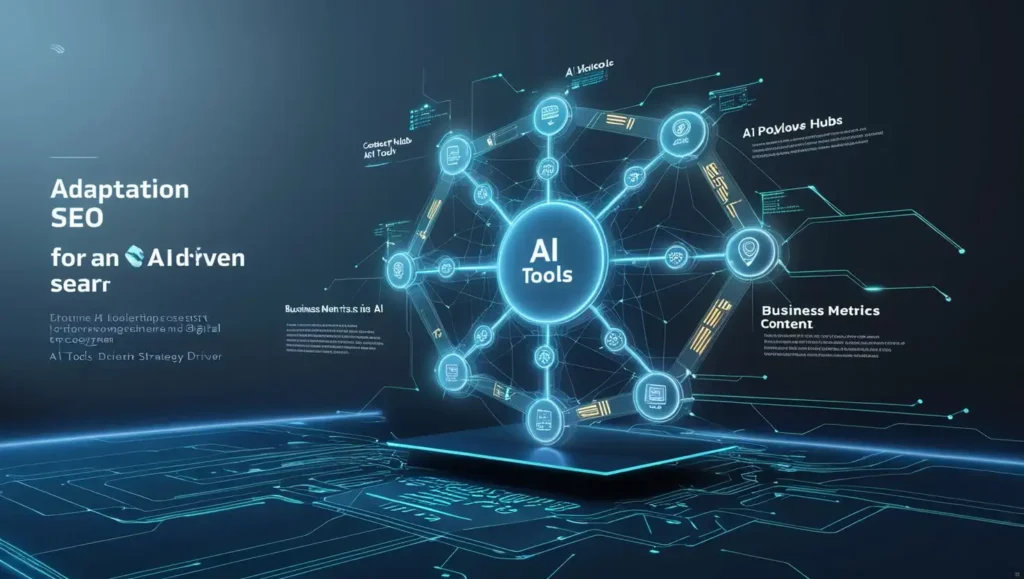Table of Contents
Introduction
For decades, search engines like Google have been essential for how we discover information online. The field of Search Engine Optimization (SEO) has grown alongside them, helping businesses and content creators improve visibility and attract audiences. But what happens to SEO if conversational AI tools like ChatGPT become the primary way we find information?
In this blog, we’ll examine how such a shift might redefine SEO, the opportunities it could create, and the challenges businesses must address in a world beyond traditional search engines.
The Rise of ChatGPT and Conversational AI
ChatGPT and similar AI tools are changing the way users interact with information. Unlike traditional search engines, which provide a list of web links, AI-based platforms deliver synthesized, conversational responses directly to users.
Why Users Prefer AI Models Like ChatGPT:

- Speed and Convenience: Users receive direct answers without navigating multiple websites.
- Personalization: AI responses can be tailored to individual contexts and preferences.
- Engagement: Conversational, human-like interactions feel intuitive.
As companies like OpenAI and Google (with Bard) continue advancing these tools, search engines may lose their dominance, particularly for quick queries, research, and product recommendations.
Implications for Search Engines:
Should conversational AI overshadow search engines, it could fundamentally alter how people discover content. The current SEO model—centered on rankings, algorithms, and backlinks—could lose relevance.
2. How AI is Changing User Behavior

AI-powered tools are driving a significant shift in how users search for and consume information.
New Patterns in User Interaction:
- Natural Language Queries: Users are moving away from keyword-based searches toward conversational, question-based queries.
- Reduced Click Dependency: AI-generated answers decrease the need for users to visit multiple websites.
- Trust in AI: Many users trust AI to provide accurate and reliable responses.
This change challenges businesses to rethink their strategies in a system where AI decides what content to deliver. ( Webascender )
3. The Role of SEO in the Current Search Ecosystem

To understand how SEO might evolve, we must first examine its current purpose.
Key Functions of SEO Today:
- Visibility: Ensuring websites rank highly for relevant queries.
- Traffic Generation: Driving organic traffic through optimized content.
- User Experience: Helping users find valuable, easy-to-navigate content.
- Monetization: Generating revenue via ads, sales, or leads.
Strengths of the Current System:
- Competition: Drives better content creation.
- Transparency: Search algorithms reward relevance and user intent.
However, much of this framework may become obsolete in an AI-first ecosystem.
4. SEO Challenges in a ChatGPT-Dominated World
- Reduced Website Traffic
AI doesn’t direct users to websites unless explicitly requested, diminishing traffic critical for business revenue.- Challenge: How can businesses generate revenue without site visits?
- Solution: Focus on being referenced within AI-generated content.
- Content Attribution
AI tools aggregate content from numerous sources but rarely provide attribution.- Challenge: How can businesses gain recognition for their contributions?
- Solution: Advocate for AI transparency and credit systems.
- Loss of Content Control
Content creators risk losing control over how their material is represented or monetized.- Challenge: How can businesses safeguard their intellectual property?
- Solution: Leverage copyright laws and partner with AI developers.
- Disrupted Advertising Models
Search advertising relies on SERPs (Search Engine Results Pages), which may disappear.- Challenge: Where will businesses advertise?
- Solution: Shift to conversational ad formats within AI tools.
5. Opportunities in an AI-Centric Ecosystem

Although challenges abound, businesses that adapt can unlock new opportunities.
- Optimizing for AI Responses
Position content to become a frequent reference for AI-generated answers.- Strategies:
- Produce content with data, insights, and factual reliability.
- Use structured data and schema markup to make content machine-readable.
- Build authority in niche topics to become a trusted source.
- Strategies:
- Creating New Content Formats
AI thrives on concise, structured content.- Examples:
- Conversational FAQs: Tailored for natural language queries.
- Micro-content: Short, precise snippets for AI to use.
- Voice Search Optimization: Adapt for voice-driven AI assistants.
- Examples:
- Collaborating with AI Platforms
Form partnerships to align with AI tools.- Examples:
- Licensing proprietary content.
- Developing branded AI plugins or datasets.
- Examples:
- Monetizing Expertise
With declining website traffic, explore alternative revenue streams.- Ideas:
- Offer subscription-based content.
- Provide consulting services on AI optimization.
- Establish thought leadership through education.
- Ideas:
6. Adaptation Strategies for Businesses
- Invest in AI-Ready Content
Create content designed for AI systems.- Key Features: Precision, conciseness, and credibility.
- Enhance Brand Visibility Beyond Websites
Build a strong presence across diverse platforms.- Suggestions: Strengthen social media efforts, create video content, and engage in community-driven forums.
- Diversify Monetization
Reduce reliance on traditional web traffic.- Ideas: E-commerce platforms, digital products, and influencer partnerships.
- Advocate for Ethical AI Practices
Push for standards ensuring fair attribution and monetization opportunities.
7. Future Predictions: Where SEO is Headed
- Rise of AI-SEO Specialists
Experts will focus on optimizing content for AI rather than traditional search engines. - Fragmentation of Content Discovery
Users may rely on smaller, topic-specific platforms without central search engines. - Greater Emphasis on Trust and Authority
AI will prioritize content from credible sources. - New Metrics
KPIs like “AI response frequency” may replace SERP rankings and organic traffic metrics.
8. Conclusion: Preparing for the AI Future
The advent of AI tools like ChatGPT marks a pivotal moment for digital discovery. While traditional SEO may diminish, its core principles of relevance, quality, and user intent will evolve.
To thrive in this landscape, businesses must prioritize AI-optimized content, adapt their strategies, and embrace innovative approaches. The future of SEO promises to be as dynamic as its history—those who adapt will lead the way.
Are you ready to embrace the AI-driven SEO revolution? The time to act is now! ( Topinfo )


 Visit Our Google News Page
Visit Our Google News Page